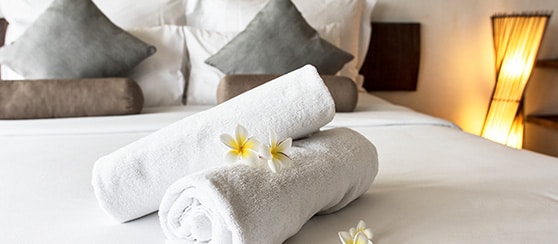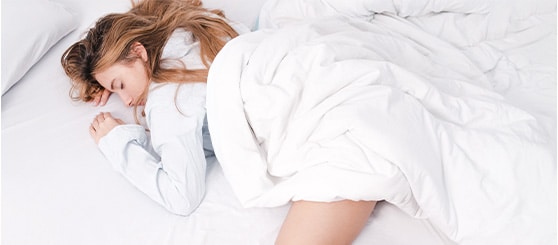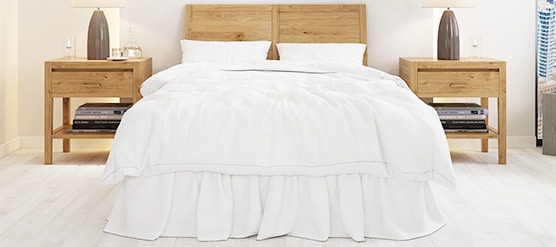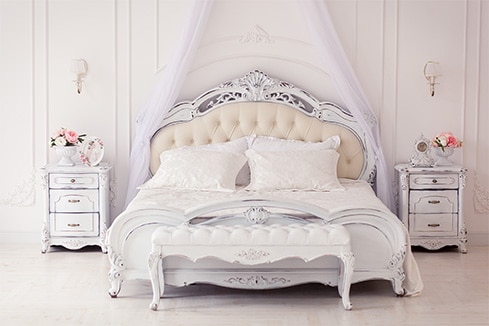Sleep King - Where the Prices Are a Sweet Dream!
There are a lot of mattress companies in South Carolina that claim to have the perfect mattress for everyone. At Sleep King, we believe that every person is different and has different needs when it comes to their mattress. That's why our mattress store in St. Stephen, SC, has a wide variety of beds and brands to choose from. That way, you can find the right mattress for your body and get the very best sleep quality possible.
As a family-owned and operated mattress store with more than 40 years of experience in the sleep industry, we know a thing or two about comfortable mattresses. St. Stephen residents choose Sleep King because we provide our customers with a personalized shopping experience. When you walk through our showroom doors, we want you to feel comfortable - both on our mattresses and with our store associates. At Sleep King, you won't ever have to worry about pushy salespeople and limited selection. Instead, you will discover that we encourage you to take your time as you search for your next bed. Sleep is incredibly important, and by proxy, finding the right mattress for your body type is too.
When you visit our showroom in St. Stephen, know that we are a full-service store with mattress experts ready to help. From questions about mattresses and their warranties to financing and mattress delivery, there's no question we haven't heard before.
We carry some of the most popular brands in America, and unlike other mattress stores in St. Stephen, offer them at the lowest prices around, guaranteed. There's a reason why we were voted your #1 mattress store in the Lowcountry - because we truly care about our customers and their quality of sleep!
Looking for discounts? Need to buy your mattress on a strict budget? We've got you covered at our new mattress clearance center in St. Stephen, where we have more than 50 models on display at 50-80% off retail value. Don't forget to ask us about our flexible financing options, where no credit is needed to make a purchase. Paying cash? We'll knock 5% off your bill!
As if that weren't enough reason to visit, remember that we provide free delivery, setup, and removal of your old mattress for FREE when you make a purchase at Sleep king.
Some services and products are only available for local residents. Please contact SleepKing for details
Contact NowWhy Choose Our Mattress
Store in St. Stephen, SC?
Our business model is simple - give customers quality beds from national brands at amazing prices, coupled with unmatched customer service. We know that your sleep is essential but also understand that normal folks aren't made of money. You need a solution that isn't going to break the bank, which is why we offer up to 75% off our products.

When we say we have a bed for every budget, we're serious.
A few of our mix and match deals include:
| Sets | Prize |
|---|---|
| Twin Mattress Sets Beginning | at $169.00 |
| Full Mattress Sets Beginning | at $199.00 |
| Queen Mattress Sets Beginning | at $229.00 |
| King Mattress Sets Beginning | at $449.00 |
Of course, a mattress would be incomplete without a headboard, footboard, and rails. For queen mattresses, those items combined are only $199. At our mattress store, we pledge to beat any competitor's price on similar product specs - guaranteed! Here are just a few of the benefits of shopping at Mattress King
- *FREE* Bed Frame for Your New Bed*
- *FREE* Same-Day Local Mattress Delivery to Your Home*
- *FREE* Set-Up & Removal of Old Mattress from Your Home*
- *FREE* Mattress Pad Included with New Mattress*
- Rest Easy with Our 60-Day Comfort Guarantee
- We Have the Best Selection of Mattresses in St. Stephen with Five National Vendors
- On-Time Delivery
- Best Warranties in the Industry
- Sleep King Will Beat Anyone's Advertise Price by $50*(on purchases $299 and above)
- 0% Financing for 48 Months (APR, With Approved Credit)
- *See Store for Additional Details

Our Selection of
National Mattress
Brands
At Sleep King, we carry the largest selection of high-quality national brand mattresses in St. Stephen.


Sleep King MLILY Mattresses
Often considered the best mattress brand in the world, innovation sets MLILY mattresses apart from others. Our customers love MLILY mattresses because they are expertly built through decades of research and rigorous testing. The folks at MLILY are committed to precision, meaning every detail of product detail they push is geared towards the ultimate satisfaction and comfort.

Sleep Restonic Mattresses
Restonic Mattresses: Restonic line of mattresses are multi-layered beds with cooling foam technology that adds resilience, support, and temperature control. The result is a cool, comfy sleep that leaves you refreshed and ready to attack the day.

Sleep King Comfort Sleep Mattresses
Every mattress in the Comfort Sleep lineup has a great combo of support and comfort, making for a restful night's sleep. With heavy-gauge coils and high-performance materials, these mattresses are durable and built to last. Be sure to try one of these mattresses out in our showroom - our customers love the pocketed coils and minimal motion transfer.

Sleep King Golden Mattresses
The Golden brand is lesser known than some, like Tempurpedic. Still, it is a quality product with many foam and non-foam options that we think you'll love. Choose from standard memory foam, hybrid, and innerspring options while visiting our showroom in St. Stephen.
Tips on Choosing the Best Bed
There's much more to choosing a good bed than how you think it will look in your bedroom. There's plenty to think about, from innerspring options to memory foam and even hybrid mattresses. At Sleep King, our priority is our customers. We pride ourselves on excellent customer service. We want to do right by you, which why we want to be sure you find the perfect bed when you visit our mattress store in St. Stephen, SC. To help you get started, here are a few tips on choosing the best bed for your sleep needs.

Visit a Showroom
This tip might seem like a no-brainer to some, but it's important that you visit a showroom so that you can lay on different beds to get a feel for what you like. At Mattress King, you will have the chance to explore different styles, designs, and shapes, and mattress materials. Finding a bed online at a price you can afford is great, but you should lie on the bed first, not just look at it on a screen.


Determine Budget
Here's a surprising fact: just because a mattress costs more money, it doesn't mean it's going to be a better bed. Sure, more expensive beds might have newer technologies and materials, but not everyone has the budget to walk into a mattress store in St. Stephen and spend $3,000. Figure out what price range you're comfortable paying and look at the best options for your bottom line.


Consider Bedroom Size
Before you swing by our showroom and start trying out beds, it might be a good idea to measure the space where your new mattress will go. If your bedroom is on the small side, a king-sized bed might be too big. Similarly, a small bed in a huge room might make for strange aesthetics. Aim for a reasonable amount of room around your bed - enough where you can walk around comfortably. As mentioned above, get specific measurements of the area you plan to use. That way, you have peace of mind knowing your new mattress will fit in your bedroom.


Choose a Mattress Material
This tip often comes down to personal preference. It will take a little bit of trial and error to figure out which material works best for your back - innerspring, memory foam, or latex. While your friend's and family's opinions matter, keep in mind that their mattress choice was subjective. What works for them won't necessarily work for you.
Need a quick refresher on different mattress materials? Here's a quick overview

Innerspring
Also called coil mattresses, innerspring beds are probably the most well-known on this short list. Innerspring mattresses are often more affordable than their latex and memory foam counterparts. These beds are ideal for people who want a lot of support and a cooler night's sleep.
Latex
This material is known for its great cooling properties and overall comfort. With latex, there are no strange off-gassing odors like you sometimes get with memory foam. Latex mattresses are ideal for people who want a responsive, bouncy feel and may have problems sleeping hot.
Memory Foam
First developed by NASA in the 70s, memory foam is probably the most popular material in the modern mattress market. Memory foam conforms to every inch of your body, giving you maximum comfort and support. Memory foam is also know for its anti-motion properties. Memory foam can be a great choice if you tend to toss and turn at night and sleep with a partner who wakes up when you do. Memory foam mattresses are ideal for people who need pressure relief, good support, and refreshing comfort.

Think About Your Back
If you have a bad back, it's crucial that you find a mattress with proper support. Slat and spring beds often offer plenty of support, but latex and memory foam options have come a long way. If you want memory foam or latex but find the support to be subpar, consider an adjustable base instead of a normal platform. That way, you can always sleep in a comfortable position that benefits your back.

Your Premier Furniture Store
St. Stephen, SC
You read that right! Sleep King is the first choice for quality beds in St. Stephen, but we also have a huge selection of furniture for your home. If you're looking for a one-stop-shop for mattresses and furniture alike, you have come to the right place. If you're shopping for a new mattress at the best price possible, why not throw in a bedroom suite at an amazing price too?
A few common furniture items that our customers love to add
to their mattress purchase include:

Living Room Sets - from traditional-style suites with classic textures to modern sets with attractive upholstery, we will help you find the best living room set for your home.
Bedroom Suites - our bedroom suites range from contemporary to classic and come in a variety of colors and styles to compliment your new mattress purchase.
Daybeds - from English-style daybeds available in espresso and cherry colors to multi-purpose beds with pull-out trundles, our selection of daybeds is unbeatable.
Futons - if you have younger children, they will love our futons. Who are we kidding? Adults do too! Futons are incredibly useful in small spaces and convert into comfy-cozy beds perfect for kids of all ages.
Bunkbeds - bunkbeds are another great option to consider if you have kids. Whether you have a classic-style home or an apartment, we have a style that fits you.
At Sleep King, we are proud to have the lowest prices in the Lowcountry
If you like what you see but don't have time to visit our mattress store in St. Stephen, don't worry. Our online store is bursting with new items and deals every day. From mattresses and bedding to furniture sets and special sale items, Mattress King has got it all. With the highest quality mattresses, the best prices in St. Stephen, a giant showroom with all the options, and a full team of helpful sales associates, you won't ever need to find another mattress and furniture store again!
GET FREE ESTIMATELatest News in St. Stephen, SC
Berkeley Co. accepts $500K grant for potential redevelopment in St. Stephen
Rey Llerenahttps://www.live5news.com/2022/09/15/berkeley-co-accepts-500k-grant-potential-redevelopment-st-stephen/
ST. STEPHEN, S.C. (WCSC) - Berkeley County says a new grant aims to possibly start redeveloping parts of St. Stephen, a rural town about 15 miles north of Moncks Corner.Berkeley County Council voted to accept a $500,000 Brownfields Assessment Grant from the Environmental Protection Agency on Monday.“It could be something like asbestos or lead-based paint, something in the soil,” Economic Development Director Kristen Lanier said. “Something that might be a risk for redevelopment, so this grant is going to allow...
ST. STEPHEN, S.C. (WCSC) - Berkeley County says a new grant aims to possibly start redeveloping parts of St. Stephen, a rural town about 15 miles north of Moncks Corner.
Berkeley County Council voted to accept a $500,000 Brownfields Assessment Grant from the Environmental Protection Agency on Monday.
“It could be something like asbestos or lead-based paint, something in the soil,” Economic Development Director Kristen Lanier said. “Something that might be a risk for redevelopment, so this grant is going to allow us to do an assessment to identify any potential risks for redevelopment.”
The grant targets two primary sites, the old St. Stephen High School, which closed in 1996, and an 85-acre area that used to be a lumber mill just off Highway 52, which closed around 1970. Up to 15 sites around the area could be looked at for revitalization as part of the grant.
“All I want is for something good to happen in St. Stephen, you know, because it seems like everything that comes to St. Stephen stays for a little while, and then, it’s gone,” St. Stephen resident Ann Judge said.
St. Stephen Mayor John Rivers said the grant will allow the town to start redeveloping and bring economic growth to the area. The county said the town could turn the old high school into a community center while the old lumber mill would be repurposed for some type of industrial use.
“The goal there, again with community input, would be that we start putting together a plan of revitalization for both those sites and others,” Lanier said.
Lanier also said they want to see if there is anything in these sites that might prevent that development.
However, some said they do not want to repurpose the old high school and keep it the way it is.
“My children came to school here too, so and I can remember all of my old high school teachers. I love it,” St. Stephen resident Julie Jenkins said.
The county said the money will be available starting Oct. 1 and will go on for the next four years. They also said the grant is the first step in a long-term process.
“This is that motion,” Lanier said. “This is that start of something, so we’re excited to see some movement in that area and to see what we can do and how we can leverage this.”
County officials said after those four years, they will have a plan developed for the sites.
The county will hold public meetings as part of the grant, but they have not announced when the meetings will be held.
Below is the full statement from St. Stephen Mayor John Rivers:
The town of St. Stephen is grateful that the EPA selected us to receive one of the 2022 Brownfield Program Grants for $500,000. We were the only municipality in Berkeley County to receive this. In countless other communities around the United States the EPA’s Brownfield program has had a proven track record of leveraging private sector investment, creating jobs and protecting the environment. St. Stephen will use this Brownfield Grant to spur our town with redevelopment and cleanup projects and bring sustained economic growth. We are thankful for the support of the Berkeley County Economic Development Office and their ability to work with myself, town council, and the town’s administration to write the grant proposal. We are ready to collaborate with the various committees that will be comprised of St. Stephen residents and business owners to help us continue to grow and revitalize our town. Receiving this prestigious award is a fantastic achievement for the Town of St. Stephen and I give credit to all involved in the initiative. We have been waiting for the results of the EPA Brownfield Grant Application for quite some time. “It has been well worth the wait.” This is the first of many blessings in store for our great town.
For more information about the Brownfields Assessment Grant, click here.
Copyright 2022 WCSC. All rights reserved.
Animal Control Seizes Dozens of Cats from Hoarding Situation in St. Stephen
berkeleycountysc.govhttps://berkeleycountysc.gov/animal-control-seizes-dozens-of-cats-from-hoarding-situation-in-st-stephen/
MONCKS CORNER, S.C. – (Tuesday, February 14, 2023) – On February 9, 2023, Berkeley County Animal Control officers responded to a hoarding situation at a residential property near Harristown Road in St. Stephen, where they discovered dozens of cats in deteriorating conditions on the property, dubbed a “Cat Sanctuary.” Cats were located living inside a rundown trailer and outside the area.Officers seized 49 cats still alive but in poor health. An additional 23 cats were found deceased inside stru...
MONCKS CORNER, S.C. – (Tuesday, February 14, 2023) – On February 9, 2023, Berkeley County Animal Control officers responded to a hoarding situation at a residential property near Harristown Road in St. Stephen, where they discovered dozens of cats in deteriorating conditions on the property, dubbed a “Cat Sanctuary.” Cats were located living inside a rundown trailer and outside the area.
Officers seized 49 cats still alive but in poor health. An additional 23 cats were found deceased inside structures at the site. The cats were taken to Berkeley Animal Center, where 10 cats were forced to be euthanized due to their sickly condition. The remainder of the cats are in the care of Animal Center staff and in stable condition.
The shelter is seeking adult cat food as well as monetary donations for medical costs and other emergency care needs for the cats. Please consider donating HERE (enter “sick cats” under “reason for donation”). The cats will be available for adoption once they are nursed back to good health. Cat food can be dropped off at 131 Central Berkeley Drive in Moncks Corner.
“Berkeley Animal Center staff is committed to conducting the proper care necessary to ensure these sickly cats are restored to good health and receive the medical attention and affection they so desperately demand at this critical time in their lives. We know this is a dire situation and that unfortunately, not all the cats rescued from these deplorable conditions could be saved. We cannot change these cats’ past circumstances and lack of quality care, but we can do our best to provide them all they need to survive and thrive going forward. We thank our fellow rescue groups for partnering with us and sharing this same mission.” -Heather McDowell, Berkeley Animal Center Director
Additionally, 15 cats were transported to Massachusetts-based rescue groups MSPCA-Angell and Northeast Animal Shelter (NEAS), two organizations Berkeley Animal Center has been working with since last year. On the day of the seizure, MSPCA also sent staff to assist with the cats’ treatment at the shelter. Additionally, Charleston Animal Society provided a veterinarian to aid with the care.
“We needed to move quickly as the cats are in pretty rough shape. They were rescued from a dire situation and are lucky help arrived when it did.” -Mike Keiley, MSPCA-Angell Director of Adoption Centers and Programs / NEAS Executive Director
The Berkeley County Sheriff’s Office has cited Suzanne Marie Melton, an owner of the Cat Sanctuary, with 20 counts of inhumane treatment of animals.
###
-Prepared by the Berkeley County Public Information Office-
Berkeley County Economic Development Hosting Public Meeting on Brownfield Grant
berkeleycountysc.govhttps://berkeleycountysc.gov/berkeley-county-economic-development-hosting-public-meeting-on-brownfield-grant/
This informational meeting will provide more details on the $500,000 EPA Brownfield Assessment Grant Berkeley County Council accepted in September 2022. Economic Development officials and representatives with Terracon Consulting Engineers and Scientists, SC Department of Health and Environmental Control (SCDHEC), and the Environmental Protection Agency (EPA) will be on hand to answer questions.This grant is part of the U.S. Environmental Protection Agency’s Brownfield Assessment Grant Program and will help fund the first steps i...
This informational meeting will provide more details on the $500,000 EPA Brownfield Assessment Grant Berkeley County Council accepted in September 2022. Economic Development officials and representatives with Terracon Consulting Engineers and Scientists, SC Department of Health and Environmental Control (SCDHEC), and the Environmental Protection Agency (EPA) will be on hand to answer questions.
This grant is part of the U.S. Environmental Protection Agency’s Brownfield Assessment Grant Program and will help fund the first steps in a large-scale revitalization initiative to improve quality of life opportunities in the St. Stephen/Russellville area. Specifically, the grant will allow the Town of St. Stephen, Berkeley County Economic Development, and the EPA to work together to determine brownfield sites in the St. Stephen area that could be redeveloped to provide more job opportunities and other quality of life resources for the community.
Brownfield sites are properties that are or may be contaminated with hazardous substances, pollutants, petroleum, or other contaminants that pose a barrier to productive reuse. Such sites are often are in struggling neighborhoods and areas with blight, deteriorated infrastructure, or other challenges. A brownfield site may include public or private properties, green spaces, or parks in need of preservation. The grant has already identified two such sites: the former St. Stephen High School, which closed in 1996, and the area’s former Lumber Mill, which operated as a steam-powered lumber mill from the 1930s to mid-1960s and closed around 1970.
Members of the public are encouraged to submit information HERE if they own a property or know of a property in the St. Stephen area that could be considered for an assessment as a brownfield site. Landowners may be asked to participate in an assessment by providing information on the site’s history.
This EPA program also provides funding for these assessments—which are critical for determining real estate values—and will help identify and/or alleviate any potential environmental concerns at a site.
This revitalization initiative, which will be conducted in multiple phases, will include community input and engagement throughout the entirety of the process. For more information on the EPA Brownfield Assessment Grant Program, go HERE.
###
-Prepared by the Berkeley County Public Information Office-
Berkeley County opened an application period from February 17 to March 17 for interested organizations to apply for funding. In partnership with Civitas LLC, the County established a CDBG Advisory Committee to review applicants and determine eligible groups before making a recommendation to Council. The money stems from the U.S. Department of Housing and Urban Development (HUD) and will provide Berkeley County communities with resources to address unique community development needs. Funding has been awarded to the following local organizations for costs associated with public facilities and demolition:
*The approximately $1.28 million approved also includes $256,910 for administration and CDBG Program-related costs.
Through the CDBG program, the U.S. Department of Housing and Urban Development (HUD) approved $1,284,550 for Berkeley County to use to address community development needs. The County is also set to receive $552,117 in HOME funding from HUD for Program Year (PY) 2023, which begins July 1, 2023 and ends June 30, 2024. The above requests will be funded beginning July 1.
The CDBG Program provides annual grants on a formula basis to states, cities, and counties to develop viable urban communities by providing decent housing and a suitable living environment, and by expanding economic opportunities, principally for low- and moderate-income persons.
“We are excited to award this funding to help better serve a diverse set of support services throughout the County. Special thanks to the CDBG Advisory Committee and to each applicant for playing an important role in helping to meet the needs of our community.” -Berkeley County Supervisor Johnny Cribb
For more information on the CDBG Program, visit the County website or the U.S. Housing and Urban Development Program website.
Delhi University, St Stephen’s fight it out over admission interview in SC
Abraham Thomashttps://www.hindustantimes.com/cities/delhi-news/delhi-university-s-claim-of-payment-seats-at-st-stephen-s-college-disputed-in-supreme-court-appeal-101692380563218.html
The court was hearing DU’s appeal against a high court order that permitted St Stephen’s College to give 15% weightage for filling seats under Christian quotaThe Delhi University (DU) on Friday told the Supreme Court that the seats for which the St Stephen’s College holds interviews are “virtually becoming payment seats”, attracting sharp rebuttal from the prestigious minority institution that said the contention was wrong and the university should not make such statements.The court was hearing D...
The court was hearing DU’s appeal against a high court order that permitted St Stephen’s College to give 15% weightage for filling seats under Christian quota
The Delhi University (DU) on Friday told the Supreme Court that the seats for which the St Stephen’s College holds interviews are “virtually becoming payment seats”, attracting sharp rebuttal from the prestigious minority institution that said the contention was wrong and the university should not make such statements.
The court was hearing DU’s appeal against an order passed by the Delhi high court on July 21, permitting the college to give 15% weightage for filling seats under the Christian students quota for the academic year 2023-24. The court directed the college to consider the Common University Entrance Test (CUET) scores only while admitting students on the unreserved seats.
Hindustan Times - your fastest source for breaking news! Read now.
Solicitor general Tushar Mehta appeared for the university and said, “I hope the college is not holding any interview. This 15% for interview is virtually becoming payment seats. This court knows about this practice.”
Mehta said that while there is no objection to the college reserving 50% seats for minorities, the seats should be filled up entirely on basis of merit decided by CUET scores. “Interview brings subjectivity. Even if I have more than 90% marks, someone with less marks gets admission,” he added.
Senior advocate A Mariarputham, appearing for the college, along with advocate Romy Chacko, objected to Mehta’s statement. “This is false. Such wrong statements need not be made. He is an officer of the court. He may argue on merits but not make such statements,” he said.
The solicitor general countered: “This is not a statement but my argument on merits.”
The college argued that in any case admissions for this year have ended on August 16, and interviews were conducted.
“This petition is infructuous as admissions closed on August 16, and classes for the new academic session have begun,” the senior counsel said.
The UGC, too, filed an appeal against the high court order and requested the court to take up both the appeals on Monday.
The bench of justices AS Bopanna and PS Narasimha agreed to the request and asked the two sides not to get “worked up” and reserve arguments for Monday.
The college approached the Delhi high court, challenging a December 8 order passed by the DU executive council that even for 50% minority quota seats, admissions should solely be done on the basis of CUET scores. The council said and no interview will be permitted. Following the council’s order, DU issued a notification on December 30. The college challenged both the order and the notification, saying they were unconstitutional.
In its interim order on July 21, the high court allowed the college to have 15% marks reserved for interview for minority candidates while general candidates had to be admitted on the basis of CUET scores.
The college claimed that over the years, it has been making admissions to undergraduate courses by earmarking 15% weightage for personal interaction or interview. Last year, with the introduction of CUET, the college had to admit students to its general category seats solely on CUET scores as the top court had in October 2022 refused to stay the HC order.
The college’s appeal which is still pending on this issue in the top court relied on the rights of minorities available under the Constitution to run and administer institutions.
Last year, too, when the controversy over CUET being applicable to minority quota seats arose, the high court on September 9, 2022 permitted St Stephen’s to proceed with its interview for Christian candidates.
New plant to "revive" St. Stephen with hundreds of jobs
Liza Lucashttps://www.live5news.com/story/31959560/new-plant-to-revive-st-stephen-create-hundreds-of-jobs/
. - One Berkeley County town is getting a revival, thanks to Viva Holdings Group, Inc. The company announced Thursday a $28 million dollar investment into a new recycling manufacturing plant in St. Stephen, creating hundreds of jobs.County leaders referred to the new plant as "Project Revival.""We had major plants here that left and left us with an employment deficit," Mayor John Rivers, said, "This will greatly enhance the employment situation here in town."In a special flag-raising ceremon...
. - One Berkeley County town is getting a revival, thanks to Viva Holdings Group, Inc. The company announced Thursday a $28 million dollar investment into a new recycling manufacturing plant in St. Stephen, creating hundreds of jobs.
County leaders referred to the new plant as "Project Revival."
"We had major plants here that left and left us with an employment deficit," Mayor John Rivers, said, "This will greatly enhance the employment situation here in town."
In a special flag-raising ceremony Thursday, Viva Holdings Group, Inc. announced plans to renovate a 177,000 sq. ft. industrial site located at 315 Ravenell Dr. in St. Stephen. The plant will initially create 200 jobs, with the potential to create 384 long term. It's a much-needed economic boost, according to county representatives.
"This is an area that has been primarily ignored with economic development in previous years," Berkeley County supervisor Bill Peagler said. "We're hoping this is going to be a foothold to come in and give new life to St. Stephen and give new hope to individuals who haven't had a job in so long."
According to the latest state data available from 2012, the average income in St. Stephen is approximately $14,000.
"I'm most excited about knowing this factory will be re-opened again and be an opportunity for our young kids...to work and earn pay," St. Stephen resident Reginald Gerald said.
Viva President and CEO Marty Sergei said the company has already hired around a dozen people from the town.
"This is an area that hasn't been tapped. The good quality people in this area aren't using their skills," Sergei said. "We've already hired a dozen or so folks from St. Stephen, fantastic people, hardworking. All we need to do is get a couple hundred more, and we'll have a very successful company."
According to a press release, Viva's proprietary technologies use a combination of recycled rubber and recycled plastics from post-industrial and post-consumer sources. The products Viva creates at the St. Stephen location will be sold in the U.S. and exported to China.
The official start of employee hiring is scheduled for late 2016; the plant opening is set for early next year.
Copyright 2016 WCSC. All rights reserved.
Disclaimer:

 843-871-8787
843-871-8787



